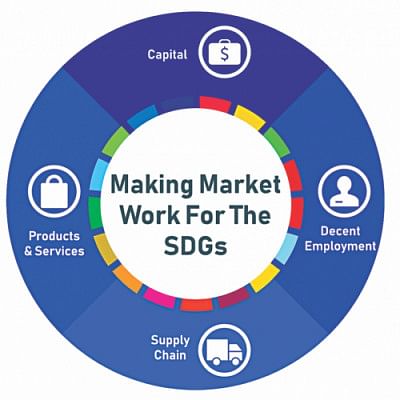Making markets work for SDGs

AS Bangladesh is growing at an exponential speed, its markets are expanding in such ways where intervention is necessary, thereby giving rise to the potential of creating a new transformative economy.
In Bangladesh, the market works for the SDGs in the products it produces, services it offers, where its capital flow, and where the employment and supply chain hires and serves the bottom of the pyramid.
Bangladesh has seen a surge of entrepreneurs, venture capital networks, policies and development projects in recent years and with the right directional support these entities can work towards the same goal – ensuring a quality life for all.
If given the opportunity, each of these bodies can come up with unique social business solutions that cater to everyone, particularly the least disadvantaged communities of the society.
In order to assess whether these endeavours have succeeded in their goal, feedback can be drawn from the people themselves through a ground-up approach on an implementation level, as well as through a top-bottom approach where policymakers and agencies collaborate on an institutional level.
Through its Innovation Hub launched in 2017, UNDP Bangladesh seeks to identify and understand the modifications in the market machinery that can create an economy where social goals are synonymous to economic prosperity; where businesses are another medium of achieving a quality life; where financial profit equals investment into human development.
One might wonder about the necessity of a social business model when many businesses engage in CSR activities. While CSR provides aid or support in money or kind, these activities are rarely sustainable.
On the other hand, in its first year, Innovation Hub has been investigating new tools that can channel private sector resources into projects that can be scaled for impact and investment opportunities.
The model was inspired by venture capital technical assistance units where an agile team can accommodate the learning and changes over time. Multiple services and pilots were tested, after which the Hub consolidated and expanded its activities in 2018.
En route to creating a community of responsible business leaders, Innovation Hub accumulated in its network over 200 companies, including 17 financial institutions, eight accelerators, small and medium-sized enterprises (SMEs), multinational corporations (MNCs) and national corporations (NCs) across sectors.
It offered several crucial services to its network, including the roll-out of Business Call to Action services and membership, support to youth entrepreneurship, testing of financial management capacity building, and plugging private sector partners into existing UNDP projects, among others.
It also served as the focal point for regional and global private sector initiatives in Bangladesh on a country level and in a national context.
Business Call to Action (BCtA) is a platform, launched in 2008, through which companies are encouraged to develop inclusive business models that engage people at the base of the pyramid.
This can take many forms; supporting bottom-of-the pyramid consumers, producers, suppliers, distributors of goods and services, and employees.
Under the umbrella of UNDP's Innovation Hub, member companies in Bangladesh have impacted 21.6 million people across the SDGs through their core business.
In supporting youth entrepreneurship for decent work and growing innovative and social businesses, the Hub launched Youth Co:Lab.
To address socio-economic alienation, UNDP, in partnership with Citi Foundation and other partners, promotes entrepreneurship, empowerment, and civic participation under this programme to create an enabling ecosystem for youth leadership and entrepreneurship.
As one of the most innovative UNDP programmes and an effective UNDP RBAP platform, working directly with and for young people, Youth Co:Lab positions UNDP as a connector by engaging a multitude of different private sector partners, and linking to a variety of ecosystem elements.
UNDP also supported a private sector ecosystem transformation. There are at least 15 impact investors currently active in Bangladesh with a total of $955 million in deployed capital, of which $834 million has been deployed by the Development Finance Institutions (DFI), while other impact investors have deployed $121 million.
After the establishment of the Alternative Investment Rule 2015, the UNDP-SDG Impact Finance (UNSIF) supported the establishment of the first National Advisory Board (NAB) for Impact Investment in Bangladesh.
In 2018, Bangladesh NAB secured its membership at the Global Steering Group (GSG) for Impact Investment.
While Bangladesh's capacity for investment into SDGs is expanding with the growth of its economy, there are gaps in the system to make the market work for the SDGs.
Firstly, there seems to be a gap in knowledge; advisory services and guidance in planning and measuring the impact of private sector can further the leadership which people can model after and learn from for a larger social movement.
Secondly, the financial and institutional mechanisms need to be bolstered to provide the vehicle through which resources can be channelled and allocated.
To compliment this, stakeholder relations building and convening investors with the implementing bodies and human resources need to be put in place.
Thirdly, the implementing bodies and human resources themselves can be developed in its capacity to deliver, so to maximise the allocated resources in a methodology that generates returns at a speed and effectiveness; thereafter and only thereafter sustainability can be ensured – through scalable and inclusive business models.
The writer is a contributor to The Daily Star.

 For all latest news, follow The Daily Star's Google News channel.
For all latest news, follow The Daily Star's Google News channel. 



Comments